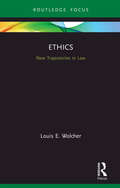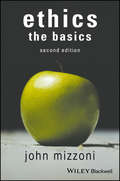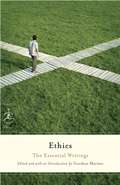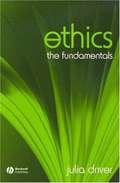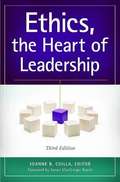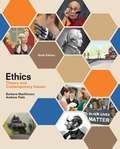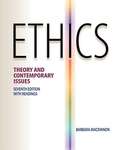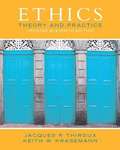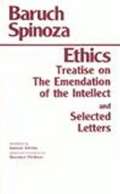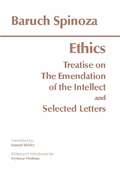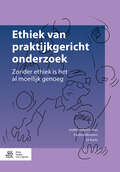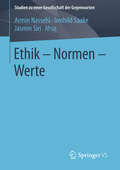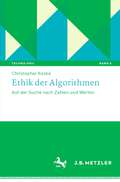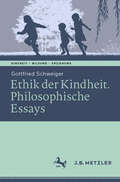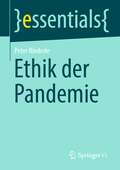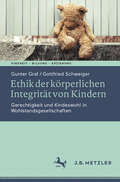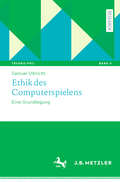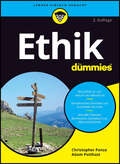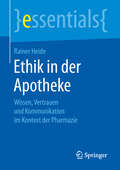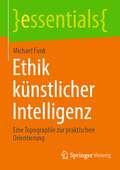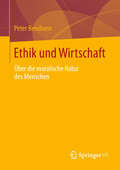- Table View
- List View
Ethics: New Trajectories in Law (New Trajectories in Law)
by Louis E. WolcherThis book examines ethics at the intersection of law and justice. If law and justice are concerned with collectively establishing the general terms on which the plurality called "we" share the earth as social beings, then ethics concerns the individual Self’s particular moral relationship with the Other. Law, the acknowledged offspring of politics, represents the kind of might that most people accept as legitimate, at least most of the time. Justice, on the other hand, is supposed to vigilantly stand guard over law: to protect us against its biases and excesses, or, at the very least, to rise up and reproach the law whenever it permits or encourages injustice. But what if the belief that a particular legally-authorized state of affairs is "just" – a common enough feeling, especially amongst the privileged – or even "unjust" and in need of correction, were itself in need of a vigilant guardian? This book argues that ethics can and should stand guard over whatever image of justice and/or just law one happens to believe in. The book thus attempts to steer a perilous course between two looming moral hazards: ethics interpreted as the rational production of ethically correct behavior (as in Kant) and ethics interpreted as the spontaneous eruption of pre-rational compassion for the suffering of the Other, come what may (as in Levinas). In the end, the book characterizes ethical life in the law as the more-or-less constant experience of the paradoxical nature of this choice – a feeling of inescapable personal responsibility for the fate of the Other. Based on the author’s well-established expertise in the area, this book will appeal to students, scholars and others with interests in legal theory and moral and political philosophy.
Ethics: The Basics, 2nd Edition
by John MizzoniUpdated and revised, Ethics: The Basics, Second Edition, introduces students to fundamental ethical concepts, principles, theories, and traditions while providing them with the conceptual tools necessary to think critically about ethical issues. Introduces students to core philosophical problems in ethics in a uniquely reader-friendly manner Lays out clearly and simply a rich collection of ethical concepts, principles, theories, and traditions that are prevalent in today’s society Considers western and non-western viewpoints and religious interpretations of ethical principles Offers a framework for students to think about and navigate through an array of philosophical questions about ethics
Ethics: The Essential Writings (Modern Library Classics)
by Gordon MarinoIn Ethics: The Essential Writings, philosopher Gordon Marino skillfully presents an accessible, provocative anthology of both ancient and modern classics on matters moral. The philosophers represent 2,500 years of thought--from Plato, Kant, and Nietzsche to Alasdair MacIntyre, Susan Wolf, and Peter Singer--and cover a broad range of topics, from the timeless questions of justice, morality, and faith to the hot-button concerns of today, such as animal rights, our duties to the environment, and gender issues. Featuring an illuminating preamble, concise introductory essays on the giants of ethical theory, and incisive chapter headnotes to the modern offerings, this Modern Library edition is a perfect single-volume reference for students, teachers, and anyone eager to engage in reflection on ethical questions, including "What is the basis for our ethical views and judgments?" Gordon Marino is professor of philosophy and director of the Hong Kierkegaard Library at St. Olaf College in Northfield, Minnesota. A recipient of the Richard J. Davis Ethics Award for excellence in writing on ethics and the law, he is the author of Kierkegaard in the Present Age, co-editor of The Cambridge Companion to Kierkegaard, and editor of the Modern Library's Basic Writings of Existentialism. His essays have appeared in The New York Times.From the Trade Paperback edition.
Ethics: The Fundamentals (Fundamentals of Philosophy Series)
by Julia DriverEthics: The Fundamentals explores core ideas and arguments in moral theory by introducing students to different philosophical approaches to ethics, including virtue ethics, Kantian ethics, divine command theory, and feminist ethics. The first volume in the new Fundamentals of Philosophy series. Presents lively, real-world examples and thoughtful discussion of key moral philosophers and their ideas. Constitutes an excellent resource for readers coming to the subject of ethics for the first time.
Ethics: The Heart of Leadership
by Joanne B. CiullaTop academic scholars ponder the question of ethics as it pertains to all aspects of leadership in business, government, and nonprofit organizations. * Includes contributions from philosophers, management theorists, and industrial and organizational psychologists * Reveals the roles that deception and self-deception play in exercising power * Explains complex management models in easy-to-understand, accessible language * Examines leadership across a variety of industries
Ethics: Theory and Contemporary Issues
by Andrew Fiala Barbara MacKinnonExplore the major perspectives in ethical theory and contemporary moral debates using ETHICS: THEORY AND CONTEMPORARY ISSUES, 9th Edition. Overviews and a selection of readings from traditional and contemporary sources make complex philosophical concepts reader-friendly. Comprehensive introductions to general and specific areas of ethical debate cover such influential ethical theories as religion and global ethics, utilitarianism and deontology, natural law ethics, and feminist and care ethics. Contemporary moral issues include euthanasia, sexual morality, economic justice, war, violence, globalization, structural racism, and same-sex marriage. MindTap offers assessments along with animated ethics simulations that allow you to engage with the philosophical issues and concepts discussed in the text.
Ethics: Theory and Contemporary Issues (7th Edition)
by Barbara MackinnonClosely examine the major areas of ethical theory as well as a broad range of contemporary moral debates using MacKinnon's acclaimed Ethics: Theory and Contemporary Issues, Seventh Edition. Illuminating overviews and a selection of readings from both traditional and contemporary sources make even complex philosophical concepts reader friendly. Comprehensive, clear-sighted introductions to general and specific areas of ethical debate cover major ethical theories, including feminist ethics, contract theory, and ethical relativism, before delving into issues ranging from euthanasia and sexual morality to war and globalization. A broader range of voices and philosophical traditions in this edition includes continental and non-Western philosophers, with new readings from prominent ethicists. Increased coverage of contemporary dilemmas highlights issues of widespread interest, including torture and terrorism, "partial birth" abortion, cloning, same-sex marriage, and global distributive justice. An innovative online resource center offers, among other things, animated simulations. These simulations allows you to personally engage with dilemmas and thought experiments commonly presented in introduction to ethics classes and provide instructors with a way to seamlessly integrate online assignments into the class.
Ethics: Theory and Practice
by Jacques P. Thiroux Keith W. KrasemannWith a clear presentation, Ethics: Theory and Practice educates readers about ethical theory and applies concepts to classic and contemporary moral problems (lying, cheating, establishing ethical business practices, honoring ethical obligations in medicine, etc. ). This title educates readers about ethical theory and its applications in a way that beginning students can understand. Ethics is neither technical nor does it plunge readers into complex readings without sufficient background. This title is fully updated with global issues and non-Western ethical views. Besides updating the foundations of the book, the author incorporates new and relevant material, most of which is often unique only to this title.
Ethics: With the Treatise on the Emendation of the Intellect, and Selected Letters
by Benedictus De SpinozaSince their publications in 1982, Samuel Shirley's translations of Spinoza's Ethics and Selected Letters have been commended for their accuracy and readability. Now with the addition of his new translation of Treatise on the Emendation of the Intellect this enlarged edition will be even more useful to students of Spinoza's thought. Foreward by Seymour Feldman.
Ethics: with The Treatise on the Emendation of the Intellect and Selected Letters
by Baruch Spinoza Seymour Feldman Samuel ShirleySince their publication in 1982, Samuel Shirley's translations of Spinoza's Ethics and Selected Letters have been commended for their accuracy and readability. Now with the addition of his new translation of Treatise on the Emendation of the Intellect this enlarged edition will be even more useful to students of Spinoza's thought.
Ethiek van praktijkgericht onderzoek: Zonder Ethiek Is Het Al Moeilijk Genoeg
by Eveline Wouters Sil AartsDit boek heeft als doel onderzoekers in de praktijk, en met name begeleiders van onderzoek in de praktijk op het hbo en daarbuiten, een handreiking te bieden om ethische dilemma’s waar te nemen en bespreekbaar te maken. Onderzoek in de praktijk is al lastig op zich, het goed herkennen, omgaan met en begeleiden van situaties die ethische vragen oproepen, die gaan over wat goed, wenselijk en verantwoord onderzoek is, maken het onderzoek nog lastiger. Aan de hand van verschillende fases van het onderzoek (vanaf het eerste idee tot en met de rapportage) worden verschillende ethische vraagstukken besproken. Deze vraagstukken gaan vaak over de afweging hoe het belang van de (individuele) deelnemer opweegt tegen het belang van de kennisontwikkeling door middel va het onderzoek of het belang van de onderzoeker. Maar ook: wat te doen met vertrouwelijke informatie, of de wensen van de opdrachtgever, hoe de resultaten eerlijk gepresenteerd kunnen worden en vele andere vraagstukken. Deze worden alle geïllustreerd met voorbeelden uit de praktijk. Daarnaast wordt specifiek ingegaan op dilemma’s rondom beoordelen van (afstudeer)werk, de nieuwe technologische mogelijkheden van dataverzameling (big data), en de wet- en regelgeving.
Ethik - Normen - Werte
by Armin Nassehi Irmhild Saake Jasmin SiriWährend philosophische Theorien üblicherweise die Inkonsistenzen eines modernen Werte-Pluralismus mit neuen ethischen Konzepten heilen wollen, interessiert sich die soziologische Systemtheorie für die schlichte Beobachtung moralischer und ethischer Kommunikation. In den Blick rücken dabei praktische Situationen, in denen ethische Konzepte, moralische Subjekte, normative Ansprüche und Werte entstehen und anschlussfähig werden. Dieser Band versammelt empirische Studien zu so unterschiedlichen Kontexten wie Krankenhäusern, Wirtschaftsorganisationen, politischen Debatten und Mode und vermittelt so einen Eindruck von den unterschiedlichen Gegenwarten einer sich moralisch beschreibenden Gesellschaft.
Ethik der Algorithmen: Auf der Suche nach Zahlen und Werten (Techno:Phil – Aktuelle Herausforderungen der Technikphilosophie #6)
by Christopher KoskaAlgorithmenethik ist ein Versuch zur Spezifikation von moralphilosophischen Fragen, die sich aus den Veränderungs- und Transformationsprozessen der Digitalisierung ergeben. Als wissenschaftliche Unternehmung zielt sie in erster Linie darauf, ethische Kriterien und Prinzipien für eine nachhaltige Wertschöpfung durch eine verantwortungsbewusste und vertrauensvolle Datennutzung zu finden und zu begründen. Ziel dieses Buches ist es, einen Beitrag zur Verortung und zum weitläufigen Entwicklungspotential einer eigenständigen Algorithmenethik zu leisten. Dabei besteht die zentrale Aufgabe darin, das Transparenz- und Kontrollproblem im Kontext von digitalen Technologien, welches sich auch als ein Kompetenz- bzw. Befähigungsproblem darstellen lässt, begrifflich zu beschreiben und einem ethischen Zugriff zugänglich zu machen, um es anschließend zu beurteilen und Gestaltungsperspektiven aufzuzeigen.
Ethik der Kindheit: Philosophische Essays (Kindheit – Bildung – Erziehung. Philosophische Perspektiven)
by Gottfried SchweigerDieses Buch versammelt Essays zur Philosophie der Kindheit. Worin besteht eine gerechte Gesellschaft für Kinder? Sind Kinder besonders verletzbar? Was schulden wir minderjährigen Flüchtlingen oder Kindern in Armut? Was ist eine gute Jugend? Die Essays in diesem Buch stellen und beantworten diese Fragen aus Sicht einer Ethik der Kindheit.
Ethik der Macht der öffentlichen Verwaltung: Zwischen Praxis und Reflexion (Geschichte und Ethik der Polizei und öffentlichen Verwaltung)
by Nanina Marika Sturm Emanuel JohnDiesem Buch liegt die These zugrunde, dass sich ein Verständnis der Macht der öffentlichen Verwaltung nicht allein auf die Befugnisse beschränkt, mit denen deren Mitarbeiter*innen ausgestattet sind. Um die verschiedenen Dimensionen der Macht der öffentlichen Verwaltung zu erkunden, werden Beiträge aus verschiedenen fachlichen Perspektiven versammelt. So soll einerseits deutlich werden, inwiefern in die Macht der öffentlichen Verwaltung auch soziale und kulturelle Faktoren einfließen. Andererseits sollen dadurch Perspektiven für eine ethische Gestaltung der alltäglichen Verwaltungspraxis freigelegt werden.
Ethik der Pandemie (essentials)
by Peter RinderleDie Corona-Krise zwingt uns zu gewaltigen Veränderungen unserer privaten Lebensführung und erfordert höchst umstrittene politische Maßnahmen zum Schutz der Gesundheit und zur Verteilung knapper Ressourcen. Sie verlangt große Anstrengungen von den Wissenschaften, und sie hat nicht zuletzt erhebliche Auswirkungen auf die kulturelle Identität von Gemeinschaften. Dieses Büchlein gibt einen Überblick über die wichtigsten Fragen und Probleme, die eine globale Pandemie für die philosophische Ethik aufwirft. Nach einer Analyse des Begriffs und des Werts der Gesundheit präsentiert und bewertet es die prominentesten Lösungsvorschläge und soll mit einer Reflexion über die Forderungen der Gerechtigkeit und die Inhalte eines guten Lebens zur Orientierung unseres persönlichen und politischen Handelns beitragen.
Ethik der körperlichen Integrität von Kindern: Gerechtigkeit und Kindeswohl in Wohlstandsgesellschaften (Kindheit – Bildung – Erziehung. Philosophische Perspektiven)
by Gunter Graf Gottfried SchweigerDieses Buch befasst sich mit der Gefährdung des Körpers von Kindern in Wohlstandsgesellschaften. Die körperliche Unversehrtheit ist ein wichtiger Teil des körperlichen und seelischen Wohlbefindens eines Kindes, aber sie kann auch durch verschiedene Bedrohungen in der Kindheit verletzt werden; dies beeinträchtigt nicht nur die körperliche Gesundheit, sondern verursacht auch seelische Schäden und führt zu Verzerrungen in der Entwicklung des Selbst. Die Autoren gehen auf drei Bereiche ein, die unterschiedlich schwerwiegende Gefährdungen darstellen: (1) Körper und Essen, (2) Körper und Sexualität, und (3) Körper und Gewalt. Durch eine eingehende Auseinandersetzung mit dem vorhandenen theoretischen und empirischen Wissen sowie eine gründliche ethische Analyse werden die zentralen Ungerechtigkeiten in den genannten Bereichen identifiziert und die Akteure mit Verantwortung gegenüber Kindern aufgezeigt. Abschließend geben die Autoren einen wertvollen Einblick in die Notwendigkeit einer ethischen Grundlage für Maßnahmen zum Schutz von Kindern und ihren Körpern.
Ethik der mediatisierten Welt
by Matthias RathDer Band erweitert die Medienethik über Medieninhalte und Medienpraxis hinaus zur ,,Ethik der mediatisierten Welt". Er fußt dabei einerseits auf der Einsicht in die grundsätzliche Medialität des Menschen sowie die daraus folgende Prägung seiner gesellschaftlichen Realität und überbrückt andererseits die Kluft zwischen normativer Ethik und deskriptiven Kommunikations- und Medienwissenschaften. Eine Ethik der mediatisierten Welt muss dabei nicht nur die eigenen philosophischen Wurzeln bedenken, sondern die medienethischen Grundbegriffe auch interdisziplinär beherrschen. Sie wird daher als integrative Disziplin zwischen Philosophie und Kommunikations- und Medienwissenschaften verstanden.
Ethik der mediatisierten Welt: Grundlagen und Perspektiven
by Matthias RathDer Band erweitert die Medienethik über Medieninhalte und Medienpraxis hinaus zur „Ethik der mediatisierten Welt“. Er fußt dabei einerseits auf der Einsicht in die grundsätzliche Medialität des Menschen sowie die daraus folgende Prägung seiner gesellschaftlichen Realität und überbrückt andererseits die Kluft zwischen normativer Ethik und deskriptiven Kommunikations- und Medienwissenschaften. Eine Ethik der mediatisierten Welt muss dabei nicht nur die eigenen philosophischen Wurzeln bedenken, sondern die medienethischen Grundbegriffe auch interdisziplinär beherrschen. Sie wird daher als integrative Disziplin zwischen Philosophie und Kommunikations- und Medienwissenschaften verstanden.
Ethik des Computerspielens: Eine Grundlegung (Techno:Phil – Aktuelle Herausforderungen der Technikphilosophie #4)
by Samuel UlbrichtTrotz der steigenden Zahl an Computerspielern weltweit markiert die moralische Einordnung von Computerspielhandlungen ein bislang ungelöstes Rätsel der philosophischen Ethik. Angesichts der Brisanz der Thematik im Alltag (zu sehen an der ‚Killerspiel-Debatte‘) ist augenfällig, dass es einer differenzierten fachlichen Klärung des Phänomens bedarf: Kann das Spielen von Computerspielen unmoralisch sein? Zur Beantwortung dieser Frage erörtert der Autor zunächst, was wir überhaupt tun, wenn wir Computerspiele spielen: Über welche Art von Handlung sprechen wir? Im zweiten Schritt erfolgt eine moralische Einordnung, die erschließt, ob (und wenn ja, warum) manche Computerspielhandlungen moralisch problematisch sind. Die hier angestellten Überlegungen gewähren einen grundlegenden Einblick in die normative Dimension des Computerspielens.Samuel Ulbricht hat in Stuttgart Philosophie und Deutsch auf Lehramt studiert und dort sein erstes Staatsexamen mit Auszeichnung absolviert. Für seine Abschlussarbeit zur Ethik des Computerspielens erhielt er den „Preis der Freunde der Universität Stuttgart“. Aktuelle Forschungsschwerpunkte sind normative Unterschiede der Moraltheorien, Problembereiche der angewandten Ethik sowie die Ästhetik und Ethik des Computerspielens. Derzeit unterrichtet er die Fächer Deutsch und Ethik am Liselotte-Gymnasium in Mannheim.
Ethik für Dummies (Für Dummies)
by Christopher Panza Adam PotthastWas ist richtig und was ist falsch? Wer entscheidet das, und warum ist die Antwort auf diese Frage oft so schwer zu finden? Fragen wie diese beschäftigen wohl jeden irgendwann einmal. Christopher Panza und Adam Potthast helfen Ihnen, sich den oft furchtbar komplizierten Antworten darauf zu nähern. Sie erläutern Ihnen die häufig schwer verständlichen Schriften von Kant, Hobbes und Co., erklären, wie sich Wissenschaft und Religion zur Ethik verhalten und vieles mehr. Darüber hinaus diskutieren sie Themen wie biomedizinische Ethik oder Umweltschutz, die aktuell die Öffentlichkeit bewegen. So ist dieses Buch der perfekte Begleiter für Sie, wenn Sie sich systematisch mit ethischen Fragen beschäftigen wollen.
Ethik in den Wissenschaften: Einblicke und Ausblicke (Ethik – Mensch - Technik)
by Karen JoistenDas vorliegende Buch gewährt Einblicke und Ausblicke in unterschiedliche Disziplinen der Wissenschaft und die mit ihnen einhergehenden ethischen Probleme und Fragestellungen. Das Buch richtet sich neben dem akademischen Fachpublikum vor allem auch an ein breiteres Publikum, da Ethik nur nachhaltig sein kann, wenn auch die breite Bevölkerung sich kompetent und engagiert ethischen Problemen und Fragen stellt und in den Diskurs einbringt.Die Themen, die in diesem Band diskutiert werden, beziehen sich auf: Ethos und Pathos der Architektur, ethische Aspekte des Regierens, die Digitale Transformation, eine philosophische Unterscheidung von Roboter und Mensch, Grenzen der Medizin, ethische Kriterien der Technikfolgenabschätzung, ethische Entscheidungen im Nachhaltigkeitsmanagement und eine juristische Sicht auf Nachhaltigkeit und Umweltgerechtigkeit.
Ethik in der Apotheke: Wissen, Vertrauen und Kommunikation im Kontext der Pharmazie (essentials)
by Rainer HeideDieses Buch ist ein Plädoyer dafür, dass Pharmazeuten sich mit der moralischen Bewertung ihres Handelns beschäftigen sollten. Der Pharmazeut wird als Kaufmann, selbst bei ethisch und moralisch gutem Handeln, immer anders agieren (müssen) als der Heilberufler, da bei Letzterem allein die selbstlose fachliche Hilfe als Primat des Handelns angenommen wird. Rainer Heide gibt in diesem essential Denkanstöße und Handlungsempfehlungen im interpersonellen Kontext der öffentlichen und Klinikapotheke. Der Autor: Dipl. Biol. Rainer Heide, Pharmazeut, Schwerpunkte seiner Arbeit sind geriatrische Pharmazie und Ethik in der Pharmazie. Rainer Heide lehrt als Honorardozent in der pflegerischen Ausbildung am Klinikum der Universität Jena und an verschiedenen Weiterbildungseinrichtungen. Er ist Mitglied in der Deutschen Gesellschaft für Geriatrie, dem Arbeitskreis „Reduktion freiheitsentziehender Maßnahmen in der Pflege“ der Stadt Jena und Vorstand des Jenaer Demenz Informations- und Beratungsverein JeDI e.V.
Ethik künstlicher Intelligenz: Eine Topographie zur praktischen Orientierung (essentials)
by Michael FunkKünstliche Intelligenz ist zum vielschichtigen Gegenstand ethischer Debatten geworden. Ob Richtlinien fairer Digitalisierung und vertrauenswürdiger Algorithmen, Gestaltung nachhaltiger Geschäftsmodelle, informatische Grundbildung in Schulen oder Existenzfragen freiheitlich-demokratischer Gesellschaften – KI-Ethik steht vor komplexen Herausforderungen. Grundsätzlicher Klärungsbedarf entsteht durch die verschiedenen Zugänge, Interessen und Begrifflichkeiten, die aufeinandertreffen. Vorliegendes essential präsentiert auf zugängliche Weise wissenschaftliches Überblickswissen zur KI-Ethik. Als praktische Orientierungshilfe im komplexen Terrain dient eine thematische Topographie, einschließlich zentraler Begriffe. Zusammenhänge zwischen Industrie 5.0, Regulierung, Post- und Transhumanismus, selbstfahrenden Autos, moralischen Maschinen, nachhaltiger Digitalisierung oder dem Anthropozän werden mit Blick auf KI-Ethik systematisch sichtbar gemacht.
Ethik und Wirtschaft
by Peter BendixenEthik ist ein sehr altes Thema. Doch die Verbindung mit der Wirtschaft ist noch frisch und unausgereift. Es gibt reale Gründe für die Aktualität dieser Fragestellung, und zugleich gibt es Zweifel, ob wir - namentlich die Ökonomen - die richtigen Ansätze zur Wirtschaftsethik gefunden haben. Zu viele Experten haben sich in ihrem eigenen Fachdenken eingeigelt und weisen Gedanken, die neue Wege auftun wollen, ihre stachelige Seite. Meine Grundthese in dieser Schrift lautet: Die Ethik des praktischen Wirtschaftens muss nicht erst erfunden werden, sondern kann als Lehre von der moralischen Kraft aus den elementaren Komponenten des praktischen Wirtschaftens herausdestilliert und zur Sprache gebracht werden.
